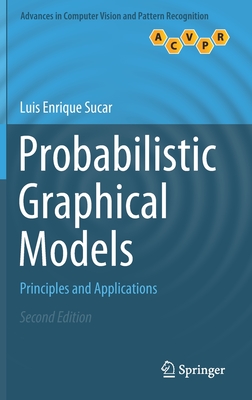Learning Probabilistic Graphical Models in R
暫譯: 在 R 中學習機率圖模型
David Bellot
- 出版商: Packt Publishing
- 出版日期: 2016-04-29
- 售價: $1,510
- 貴賓價: 9.5 折 $1,434
- 語言: 英文
- 頁數: 250
- 裝訂: Paperback
- ISBN: 1784392057
- ISBN-13: 9781784392055
-
相關分類:
R 語言
-
相關翻譯:
概率圖模型基於R語言 (簡中版)
買這商品的人也買了...
-
 Windows via C/C++, 5/e
Windows via C/C++, 5/e$2,600$2,470 -
 Concurrent Programming on Windows (Paperback)
Concurrent Programming on Windows (Paperback)$2,275$2,161 -
 $399Practical Packet Analysis, 2/e : Using Wireshark to Solve Real-World Network Problems (Paperback)
$399Practical Packet Analysis, 2/e : Using Wireshark to Solve Real-World Network Problems (Paperback) -
 The Linux Command Line: A Complete Introduction (Paperback)
The Linux Command Line: A Complete Introduction (Paperback)$1,510$1,434 -
 Practical Malware Analysis: The Hands-On Guide to Dissecting Malicious Software (Paperback)
Practical Malware Analysis: The Hands-On Guide to Dissecting Malicious Software (Paperback)$1,995$1,890 -
 How Google Tests Software (Paperback)
How Google Tests Software (Paperback)$1,560$1,482 -
 Think Like a Programmer: An Introduction to Creative Problem Solving (Paperback)
Think Like a Programmer: An Introduction to Creative Problem Solving (Paperback)$1,280$1,254 -
 Data Just Right: Introduction to Large-Scale Data & Analytics (Paperback)
Data Just Right: Introduction to Large-Scale Data & Analytics (Paperback)$1,320$1,254 -
 Don't Make Me Think, Revisited: A Common Sense Approach to Web Usability, 3/e (Paperback)
Don't Make Me Think, Revisited: A Common Sense Approach to Web Usability, 3/e (Paperback)$1,700$1,666 -
 Soft Skills: The software developer's life manual (Paperback)
Soft Skills: The software developer's life manual (Paperback)$1,360$1,292 -
 操作系統真象還原
操作系統真象還原$773$734 -
 Advances in Financial Machine Learning (Hardcover)
Advances in Financial Machine Learning (Hardcover)$1,980$1,881 -
 $312透視 APT — 賽博空間的高級威脅
$312透視 APT — 賽博空間的高級威脅 -
 $534增強型分析:AI驅動的數據分析、業務決策與案例實踐
$534增強型分析:AI驅動的數據分析、業務決策與案例實踐 -
 $2,432BPF Performance Tools : Linux System and Application Observability (Paperback)
$2,432BPF Performance Tools : Linux System and Application Observability (Paperback) -
 工業4.0 的物聯網智慧工廠應用與實作:使用 Arduino.Node-RED.MySQL.Node.js
工業4.0 的物聯網智慧工廠應用與實作:使用 Arduino.Node-RED.MySQL.Node.js$500$199 -
 $708遷移學習 -- TRANSFER LEARNING (楊強教授新作)
$708遷移學習 -- TRANSFER LEARNING (楊強教授新作) -
 CQRS (Command Query Responsibility Segregation)
CQRS (Command Query Responsibility Segregation)$1,050$1,029 -
 資料科學的建模基礎 : 別急著 coding!你知道模型的陷阱嗎?
資料科學的建模基礎 : 別急著 coding!你知道模型的陷阱嗎?$599$509 -
 $652Python 漫遊數學王國 — 高等數學、線性代數、數理統計及運籌學
$652Python 漫遊數學王國 — 高等數學、線性代數、數理統計及運籌學 -
 AI 必須!從做中學貝氏統計 – 從事機器學習、深度學習、資料科學、大數據分析一定要懂的統計利器 (Bayesian Statistics for Beginners: A Step-By-Step Approach)
AI 必須!從做中學貝氏統計 – 從事機器學習、深度學習、資料科學、大數據分析一定要懂的統計利器 (Bayesian Statistics for Beginners: A Step-By-Step Approach)$1,200$948 -
 $657Web 漏洞解析與攻防實戰
$657Web 漏洞解析與攻防實戰 -
 CPU 眼裡的 C/C++
CPU 眼裡的 C/C++$534$507 -
 $599複盤
$599複盤 -
 LangChain 開發手冊 -- OpenAI × LCEL 表達式 × Agent 自動化流程 × RAG 擴展模型知識 × 圖形資料庫 × LangSmith 除錯工具
LangChain 開發手冊 -- OpenAI × LCEL 表達式 × Agent 自動化流程 × RAG 擴展模型知識 × 圖形資料庫 × LangSmith 除錯工具$680$537
相關主題
商品描述
Key Features
- Predict and use a probabilistic graphical models (PGM) as an expert system
- Comprehend how your computer can learn Bayesian modeling to solve real-world problems
- Know how to prepare data and feed the models by using the appropriate algorithms from the appropriate R package
Book Description
Probabilistic graphical models (PGM, also known as graphical models) are a marriage between probability theory and graph theory. Generally, PGMs use a graph-based representation. Two branches of graphical representations of distributions are commonly used, namely Bayesian networks and Markov networks. R has many packages to implement graphical models.
We'll start by showing you how to transform a classical statistical model into a modern PGM and then look at how to do exact inference in graphical models. Proceeding, we'll introduce you to many modern R packages that will help you to perform inference on the models. We will then run a Bayesian linear regression and you'll see the advantage of going probabilistic when you want to do prediction.
Next, you'll master using R packages and implementing its techniques. Finally, you'll be presented with machine learning applications that have a direct impact in many fields. Here, we'll cover clustering and the discovery of hidden information in big data, as well as two important methods, PCA and ICA, to reduce the size of big problems.
What you will learn
- Understand the concepts of PGM and which type of PGM to use for which problem
- Tune the model's parameters and explore new models automatically
- Understand the basic principles of Bayesian models, from simple to advanced
- Transform the old linear regression model into a powerful probabilistic model
- Use standard industry models but with the power of PGM
- Understand the advanced models used throughout today's industry
- See how to compute posterior distribution with exact and approximate inference algorithms
About the Author
David Bellot is a PhD graduate in computer science from INRIA, France, with a focus on Bayesian machine learning. He was a postdoctoral fellow at the University of California, Berkeley, and worked for companies such as Intel, Orange, and Barclays Bank. He currently works in the financial industry, where he develops financial market prediction algorithms using machine learning. He is also a contributor to open source projects such as the Boost C++ library.
Table of Contents
- Probabilistic Reasoning
- Exact Inference
- Learning Parameters
- Bayesian Modeling – Basic Models
- Approximate Inference
- Bayesian Modeling – Linear Models
- Probabilistic Mixture Models
- Appendix
商品描述(中文翻譯)
#### 主要特點
- 預測並使用概率圖模型 (PGM) 作為專家系統
- 理解您的電腦如何學習貝葉斯建模以解決現實世界的問題
- 知道如何準備數據並使用適當的 R 套件中的算法來餵入模型
#### 書籍描述
概率圖模型 (PGM,亦稱為圖形模型) 是概率論與圖論的結合。一般來說,PGM 使用基於圖的表示法。常用的分佈圖形表示法有兩個分支,即貝葉斯網絡和馬爾可夫網絡。R 語言有許多套件可以實現圖形模型。
我們將首先展示如何將經典統計模型轉換為現代 PGM,然後探討如何在圖形模型中進行精確推斷。接下來,我們將介紹許多現代 R 套件,幫助您對模型進行推斷。我們將運行一個貝葉斯線性回歸,您將看到在進行預測時使用概率方法的優勢。
接下來,您將掌握使用 R 套件及其技術的能力。最後,您將接觸到在許多領域具有直接影響的機器學習應用。在這裡,我們將涵蓋聚類和在大數據中發現隱藏信息,以及兩種重要方法,PCA 和 ICA,用於減少大問題的規模。
#### 您將學到的內容
- 理解 PGM 的概念以及針對不同問題應使用哪種類型的 PGM
- 調整模型的參數並自動探索新模型
- 理解貝葉斯模型的基本原則,從簡單到高級
- 將舊的線性回歸模型轉換為強大的概率模型
- 使用標準行業模型,但結合 PGM 的力量
- 理解當今行業中使用的高級模型
- 了解如何使用精確和近似推斷算法計算後驗分佈
#### 關於作者
**David Bellot** 是法國 INRIA 計算機科學博士畢業生,專注於貝葉斯機器學習。他曾是加州大學伯克利分校的博士後研究員,並在英特爾、Orange 和巴克萊銀行等公司工作。目前,他在金融行業工作,開發使用機器學習的金融市場預測算法。他也是 Boost C++ 庫等開源項目的貢獻者。
#### 目錄
1. 概率推理
2. 精確推斷
3. 學習參數
4. 貝葉斯建模 – 基本模型
5. 近似推斷
6. 貝葉斯建模 – 線性模型
7. 概率混合模型
8. 附錄































